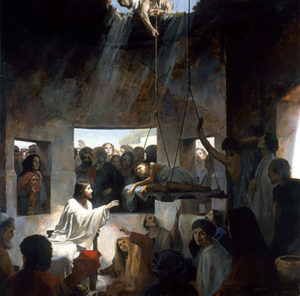And they came, bringing to him a paralytic carried by four men. And when they could not get near him because of the crowd, they removed the roof above him, and when they had made an opening, they let down the bed on which the paralytic lay. And when Jesus saw their faith, he said to the paralytic, “Son, your sins are forgiven.” Now some of the scribes were sitting there, questioning in their hearts, “Why does this man speak like that? He is blaspheming! Who can forgive sins but God alone?” And immediately Jesus, perceiving in his spirit that they thus questioned within themselves, said to them, “Why do you question these things in your hearts? Which is easier, to say to the paralytic, ‘Your sins are forgiven,’ or to say, ‘Rise, take up your bed and walk’? But that you may know that the Son of Man has authority on earth to forgive sins”–he said to the paralytic– “I say to you, rise, pick up your bed, and go home.” And he rose and immediately picked up his bed and went out before them all, so that they were all amazed and glorified God, saying, “We never saw anything like this!” – Mark 2:3-12
I’ve always thought forgiveness is a good thing. I mean, I need it after all! That my sins would be forgiven on faith alone is too good to be true. But this is not good enough. A modernist mindset has led most of us to believe that the only way to think about the forgiveness of sin is personal, even private. In the Bible, however, forgiveness not only has a personal application, but a national or corporate fulfillment as well. While there is no longer a national forgiveness indicated for us (like Israel was in the Older Testament), we are in the new nation, which is the church. The church has her King, but still lives in a kind of exile, which will end when the curse is removed. That’s the fullness of forgiveness.
In the passage above, Jesus told the paralytic, “Son, your sins are forgiven.” Jesus tells him that he is His child and is forgiven. This is remarkable. The issue then becomes a matter of forgiving sins, which was tantamount to healing. Immediately the scribes are incensed, but instead of answering their thoughts that this was blasphemy, He said to them, “Why do you question these things in your hearts? Which is easier, to say to the paralytic, ‘Your sins are forgiven,’ or to say, ‘Rise, take up your bed and walk’? But that you may know that the Son of Man has authority on earth to forgive sins.”
Leviticus is plain that God could forgive sins: And the priest shall make atonement for him for the sin that he has committed, and he shall be forgiven (Lev. 5:10). The problem is that Jesus is neither a priest, nor at the proper altar in the Temple, nor offering sacrificial blood for the one seeking forgiveness. He is a long way from Jerusalem and the Temple, not a Levite, and without sacrificial blood; nonetheless Jesus forgave the paralytic’s sin with a word.
This is true liberation. The money necessary for the sacrificial animals was not needed, nor was the requirement of traveling to Jerusalem necessary. This is a new world and new order of things. “We never saw anything like this!” Some rejoiced; some didn’t. The Scribes and the Pharisees cherished the old order of things, and this was threatening their way of life, though it’s doubtful they had any idea just how much!
Jesus’ faithfulness as the Son of Man means the authority really to forgive sins has been given to man. Mark counts on you knowing Matthew’s gospel, and here Matthew says (9:8), “When the crowds saw it, they were afraid, and they glorified God, who had given such authority to men.” Repeatedly in the Newer Testament, the saints are exhorted to forgive one another (Gal. 6:1; Eph. 4:32; Col. 3:13; James 5:15, 19-20). This is what Jesus is demonstrating at the healing of the paralytic, and it is good news because it means the old has passed away and the new has come. The church, in exile under the curse, has power to remove the curse because the Son of Man has authority. And that’s the gospel!
